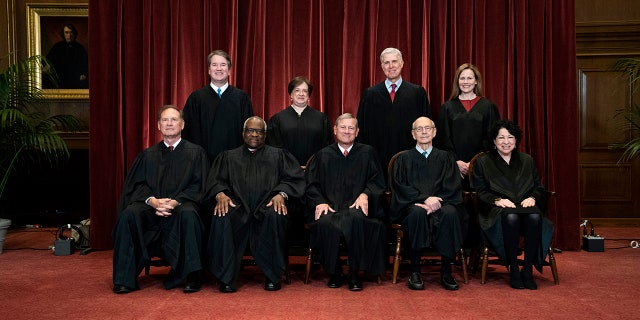Fox News Flash top headlines for June 17
Fox News Flash top headlines are here. Check out what’s clicking on Foxnews.com.
The Supreme Court sided unanimously with a Catholic foster agency in a dispute against the city of Philadelphia over whether it should be banned from participating in the city’s foster program because it excludes same-sex couples.
The group, Catholic Social Services (CSS), claimed that “Philadelphia’s attempts to exclude the Catholic Church from foster care” violated the First Amendment. Lawyers for the city, meanwhile, said that CSS “lacks a constitutional right to demand that DHS offer it a contract that omits the same nondiscrimination requirement every other FFCA must follow when performing services for the City.”
In a 9-0 ruling, the justices sided with Catholic Social Services.
“CSS seeks only an accommodation that will allow it to continue serving the children of Philadelphia in a manner consistent with its religious beliefs; it does not seek to impose those beliefs on anyone else,” Chief Justice John Roberts wrote in a majority opinion. “The refusal of Philadelphia to contract with CSS for the provision of foster care services unless it agrees to certify same-sex couples as foster parents cannot survive strict scrutiny, and violates the First Amendment.”

FILE – In this April 23, 2021, file photo members of the Supreme Court pose for a group photo at the Supreme Court in Washington. Seated from left are Associate Justice Samuel Alito, Associate Justice Clarence Thomas, Chief Justice John Roberts, Associate Justice Stephen Breyer and Associate Justice Sonia Sotomayor, Standing from left are Associate Justice Brett Kavanaugh, Associate Justice Elena Kagan, Associate Justice Neil Gorsuch and Associate Justice Amy Coney Barrett. All nine justices ruled for Catholic Social Services in a dispute against the City of Philadelphia Thursday. (Erin Schaff/The New York Times via AP, Pool, File)
SUPREME COURT UPHOLDS OBAMACERE LAW, DISMISSING CHALLENGE FROM RED STATES
Roberts was joined on his opinion by Justices Stephen Breyer, Sonia Sotomayor, Elena Kagan, Brett Kavanaugh and Amy Coney Barrett.
Barrett herself wrote a concurring opinion, which was joined fully by Kavanaugh and partially by Breyer.
“As the Court’s opinion today explains, the government contract at issue provides for individualized exemptions from its nondiscrimination rule, thus triggering strict scrutiny,” Barrett wrote. “And all nine Justices agree that the City cannot satisfy strict scrutiny.”
Sen. Josh Hawley, R-Mo., a member of the Senate Judiciary Committee said the Fulton decision was a “great ruling” that could have gone farther.
“It’s a pretty unequivocal statement I think that the court is gonna look really closely … any time you have religious institutions or organizations that are being disfavored. If they are treated any worse or any differently than a secular institution, the court’s gonna strike that down,” Hawley added.
Justice Samuel Alito also wrote a concurring opinion that was joined by Justices Neil Gorsuch and Clarence Thomas. Gorsuch wrote a concurrence that Thomas and Alito joined.
The unanimous ruling on such a hot-button issue comes as many on the left are calling for the packing of the Supreme Court and some on the right are saying the court is rejecting those calls through a series of unanimous of nearly-unanimous opinions. Hawley, however, said he doesn’t think the ruling will “deter my friends on the left from their court packing agenda. They’re very committed to this. And it will probably make them mad at Justice Breyer, I suppose.”
The case will also be considered a massive victory for social conservatives, who say that it protects religious freedom.
CLICK HERE TO GET THE FOX NEWS APP
“Today, the Supreme Court rightly affirmed that the Constitution guarantees faith-based agencies freedom from government harassment and discrimination because of their religious beliefs about marriage,” Catholic Vote President Brian Burch said in a statement.
The ACLU, however, said that the court did not recognize “a license to discriminate based on religious beliefs.”
“Opponents of LGBTQ equality have been seeking to undo hard-won non-discrimination protections by asking the court to establish a constitutional right to opt out of such laws when discrimination is motivated by religious beliefs,” Leslie Cooper, deputy director of the ACLU LGBTQ & HIV Project, said in a statement. “This is the second time in four years that the court has declined to do so. This is good news for LGBTQ people and for everyone who depends on the protections of non-discrimination laws.”
The majority opinion written by Roberts also included a citation of one of the major religious freedom rulings in recent years: the Masterpiece Cakeshop case.
“[O]ur society has come to the recognition that gay persons and gay couples cannot be treated as social outcasts or as inferior in dignity and worth,” Roberts wrote, quoting the Masterpiece Cakeshop case. “On the facts of this case, however, this interest cannot justify denying CSS an exception for its religious exercise. The creation of a system of exceptions under the contract undermines the City’s contention that its nondiscrimination policies can brook no departures. The City offers no compelling reason why it has a particular interest in denying an exception to CSS while making them available to others.”



Comments